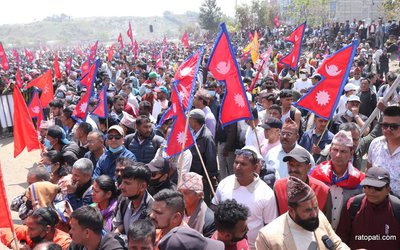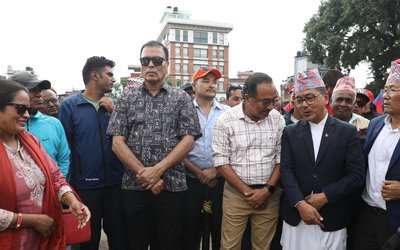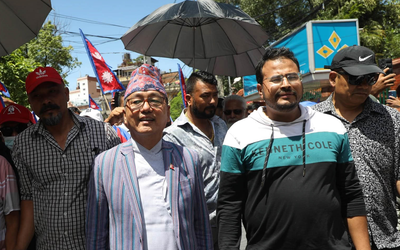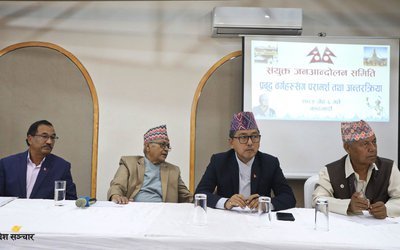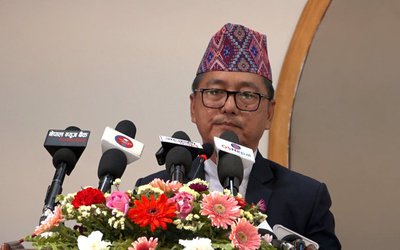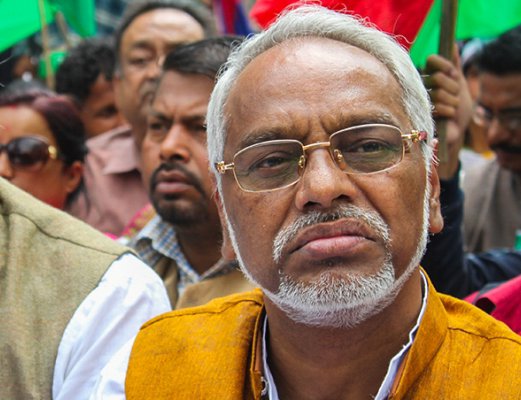
Although the government has used all kinds of tactics and forces to foil the joint agitation of Madheshis and Janajatis, the second round of protests after last year's agitation, which left 55 people dead and led to blockades on the border, is showing an impact.
The Federal Alliance accused police of harassing the Madheshi demonstrators entering Kathmandu. “Police searched all passengers entering Kathmandu. Our followers were not even allowed to enter Kathmandu,” said chairman of Federal Alliance Upendra Yadav.
The Federal Alliance, agitating against the new Constitution, announced an indefinite gherao of Singha Durbar to begin the Round 2 of their protests. The Alliance comprises twenty nine parties including two dozen ethnic outfits of Janajatis, Dalits, women and constituents of the United Democratic Madheshi Front.
“This constitution has lost its utility and the amendment alone cannot fulfill our demands. We will continue to stage the sit-in till our demands ar emet,” said Rajendra Mahato, general secretary of Sadbhavana Party. “This agitation is a do-or-die for us.”
Led by senior Madheshi leaders Rajendera Mahato, Upendra Yadav, Mahendra Raya, Hridayesh Tripathi, Sarat Singh Bhandari, Anil Kumar Jha and other leaders of Janajati, the protests paralyzed the traffic of Kathmandu valley completely.
By late 2014, Madhesis fell out of power sharing with most mainstream parties like NC, CPN-UML, and UCPN-M. The agitation for autonomy began since the 2007 agreement.
Nepal's new constitution was announced on September 20, 2015 that transformed this Himalayan country from a theocratic Hindu state to a secular, democratic republic.
This saw fresh protests against what is seen as "Kathmandu-centric discriminatory Constitution." Protesters want Nepal's new constitution to be re-written. Protests were carried out last year by Madhesis on mainly four grounds.
Large population of Madhesis, who are Indian migrants that acquired Nepalese citizenship by birth or naturalization, felt cheated as almost all top constitutional posts, including that of head of state, are reserved for citizens by descent.
They rejected division of their homeland under the seven federal province structure and demanded redrawing of federal borders based on ethnicity. They demanded fixing of electoral constituencies on the basis of population. They want proportional representation in the constituent assembly since Terai is home to over 50 percent population of Nepal.
Agitations and protests rocked Nepal for six months starting August last year. These protests left at least 55 dead; scores injured and crippled its economy. There were blockades along Nepal-India trading points soon after announcement of the Constitution.
Although an amendment was made in January this year, endorsed by two-thirds of the lawmakers, the constitution sought to address the demands of proportionate representation for Madhesis and population based seat allocation in parliament, the agitators rejected it calling it incomplete as it did not resolve the contentious issues of demarcation of the provincial boundaries.
Since the historic constituent assembly elections of 2008, when Maoists rode to power after decades of guerilla warfare, successive governments in Nepal have barely completed a year. Current Prime Minister KP Oli took charge on 11th October 2015 after a coalition government supported by the Maoists had been busy battling internal power tussle.
On taking charge he announced his government would invite Madheshi leaders for a dialogue. But he constituted the team of government interlocutors only after a month and Madhesis accused him of insincerity.
Madhesis gave the government a deadline of 12th April for demands to be met. Oli's fresh appeal for dialogue was rejected as an eyewash to hoodwink the international community.
Our Struggle May Need Some Time: Mahato
Chairperson of Sadbhvana Party RAJENDRA MAHATO spoke to New Spotlight. Excerpts:
How do you assess the participation of people in the first two days of your agitation?
It was a great success. People from all walks of life came out to support us. Despite so many hurdles created by Oli government, the participation of people was satisfactory.
How long will your Singhdurbar-centric agitation continue?
We will continue our agitation till our demands of rewriting the constitution are addressed. This is a discriminatory constitution and the constitution cannot be amended on the piecemeal basis like amendment.
Oli has said that this is the best inclusive constitution of the world and those who are demanding its rewriting are speaking the voice of external forces. How do you look at this?
This constitution is inclusive for his party cadres. Look at the appointment of ambassadors and judges of Supreme Court. How many Madheshis and Janajatis are there?
At a time when Nepali Congress is also expressing anger over the present government, why don’t you approach the Congress to make your agitation broader?
If necessary, we will hold talks with Nepali Congress as we have assured them last time that we will support any move to dislodged this government.
Prime Minister Oli has said that you did not listen to his call for negotiations. What do you say?
There is no reason to talk with a person who is insensitive towards a whole community. Prime Minister Oli is anti-Madhesh and killed nearly 50 Madheshis.
How long will it take for you to achieve the success?
Our struggle may need some more time. What I can say is that we will be able to force the rulers to rewrite the present constitution.
- MELAMCHI WATER SUPPLY: No Interruption During Monsoon
- Jun 25, 2025
- KOREAN RETURNEES: Successful Integration
- Jun 25, 2025
- UPPER TRISHULI-1: Engaging With Local
- Jun 25, 2025
- IME GROUP: Twenty Five Years Of Journey
- Jun 24, 2025
- NEPAL’S AIR POLLUTION: A Growing Health Concern
- Jun 24, 2025
